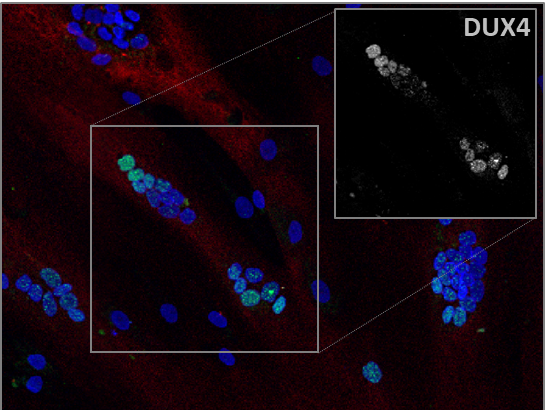Cellular heterogeneity in FSHD
Background
Facioscapulohumeral muscular dystrophy (FSHD) is a progressive muscle disease for which no cure is available. FSHD is caused by the misexpression of the transcription factor DUX4 in skeletal muscle. Intriguingly, only a small subset of muscle nuclei in a muscle cell culture express DUX4. To date, it remains unclear why only these few nuclei start to express DUX4 and how this sporadic expression pattern ultimately results in the severe muscle wasting observed in patients. In this project we aim to understand the cause and consequence of the heterogeneous DUX4 expression and to translate these findings to the observed pathology in FSHD-affected muscle.
Fig. Microscopic image of an in vitro differentiated muscle cell culture that shows sporadic DUX4 expression. Nuclei are stained in blue, DUX4 is stained in green, differentiated muscle cells are stained in red
Methods
We apply single-cell RNA and chromatin studies to patient-derived (muscle) cell lines and cell models to achieve a better understanding of the mechanisms that regulate DUX4 expression in tissue culture and the subsequent spreading of cellular toxicity throughout the entire muscle. We combine these cell model studies with studies in patient-derived muscle biopsies to evaluate the heterogeneity of DUX4 pathology in vivo.
Relevance
There is currently no therapy available for FSHD but trials are ongoing. Advanced understanding of FSHD muscle pathology will aid to directed therapy development for FSHD.
Financiering: Prinses Beatrix Spierfonds



